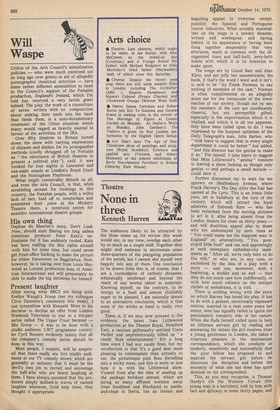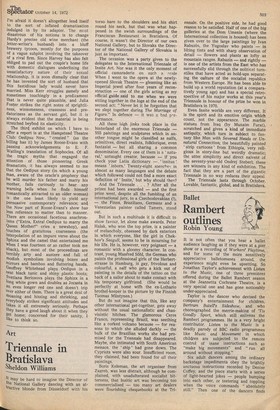Theatre
None in three
Kenneth Hurren
The audiences likely to be attracted by the three items up for review this week would not, in my view, overlap each other by so much as a single stall. Together they might well embrace in microcosm some three-quarters of the playgoing population of the parish, but I cannot slot myself very happily into any of them. One conclusion to be drawn from this is, of course, that I am a curmudgeon of catholic distastes, whimsically intolerant and beyond the reach of any mortal talent to entertain. Knowing myself, on the contrary, to be benign to a fault and almost childishly eager to be pleased, I am naturally drawn to an alternative conclusion, which is that none of the works at hand is really very good.
There is, if we may now proceed to the evidence, the latest Joan Littlewood • production,at the Theatre Royal, Stratford East, a raucous gallimaufry entitled Costa Packet and unpretentiously billed as "a candy floss entertainment." It's a long time since I had any candy floss, but my recollection is that it's a good deal more pleasing to contemplate than actually to eat, the picturesque pink floss dwindling into a sticky mess, and this is more or less how it is with the Littlewood show. Viewed from afar the idea of sending up the package holidays abroad, which are luring so many affluent workers away from Southend and Blackpool to paellaand-chips in Iberia, has an instant and beguiling appeal to everyone except, possibly, the Spanish and Portuguese tourist industries. What actually materialises on the stage is a tawdry disaster, witless and woebegone, and having indeed, in its appearance of having been flung together desperately that very afternoon, much in common with the illorganised tours and half-built, jerry-built hotels with which it is its intention to make sport.
The songs are by Lionel Bart and Alan Klein, and are jolly but unmemorable; the book, if that's the word I want and it isn't, is said to be "by Frank Norman, to say nothing of members of the cast." Norman is often complimented on an allegedly acute ear for the vernacular of the lower reaches of our society, though not by me; the members of the cast are inordinately cheerful, but not perceptibly gifted, especially in the improvisation which it is implied, and which it is all too apparent, they have been called upon to do. I was impressed by the buoyant optimism of the Daily Telegraph's man, John Barber, who "took leave to suggest that in every single department it could be better" but added, "and this director has the genius to make it so." For myself, I take leave to suggest that Miss Littlewood's " genius " consists in leaving a show looking as though only genius — and perhaps a small miracle — could save it.
Further discontent lay in wait for me uptown on Shaftesbury Avenue, where Frank Harvey's The Day After the Fair has opened at the Lyric. This is an ironic little yarn, set in Salisbury at the turn of the century, which will attract the loyal admirers of Deborah Kerr — who has been reclaimed from the moving pictures to act in it, after being absent from the London theatre for close on thirty years — and will doubtless appeal also to those who are undismayed by such lines as "You could make me the happiest man in England" or, alternatively, "You poor, stupid little fool!" and can nod approvingly at such exemplary cathedral-city sentiments as "After all, we're only here to do His will," or who are, in any case, so enchanted by the idea of a play with a story — and one, moreover, with a beginning, a middle and an end — that they do not much care how indifferently, or with how much reliance on the antique clichés of melodrama, it is told.
There is nothing wrong with the story on which Harvey has based his play. It has to do with a genteel, emotionally repressed matron, married to a man some years her senior, who has signally failed to ignite the passionately romantic side of her nature. When she finds herself called upon to help an illiterate servant girl by reading and answering the letters the girl receives from a young gentleman in London, she takes a vicarious pleasure in the sentimental correspondence, which she conducts so tenderly, sensitively and successfully that the poor fellow has proposed to and married the servant girl before he discovers the deception and before the enormity of what she has done has quite dawned on his correspondent.
This, as you may recognise, is Thomas Hardy's On the Western Circuit (the young man is a barrister), told by him with tact and delicacy in some thirty pages, and I'm afraid it doesn't altogether lend itself to the sort of inflated dramatisation indulged in by its adapter. The most disastrous of his notions is to change Hardy's precise old wine merchant (the letter-writer's husband) into a bluff brewery tycoon, mostly for the purposes of a vague subplot involving the takeover of a rival firm. Since Harvey has also felt obliged to pad out the couple's home life With domestic dialogues underlining the unsatisfactory nature of their sexual relationship, it is soon dismally clear that he has invented the sort of husband that this fastidious lady would never have married. Miss Kerr struggles gamely and sometimes touchingly in a predicament that is never quite plausible, and Julia Foster strikes the right notes of sprightliness, winsomeness, crassness and pre datoriness as the servant girl, but it is always evident that the material is being stretched beybnd its elasticity.
The third exhibit on which I have to offer a report is at the Hampstead Theatre Club: Oedipus Now, " created " (as the billing has it) by James Roose-Evans with passing acknowledgements to E. F.
Watling's translation of Sophocles. Of all the tragic myths that engaged the attention of those pioneering Greek dramatists, it has always seemed to me that the Oedipus story (in which a young man, aware of the oracle's prophecy that he will murder his father and marry his mother, fails curiously to hear any warning bells when he finds himself romantically attracted to an older woman) is the one least likely to yield any Persuasive contemporary relevance; and the Now part of Roose-Evans's show has less reference to matter than to manner. There are occasional facetious anachron isms ("Extra, Extra! Oedipus to marry the Queen Mother!" cries a newsboy), and touches of gratuitous coarseness (the interpolation of an impure verse about the Sphinx and the camel that entertained me When I was fourteen or so rather took me aback), but most of the proceedings are terribly arty and austere and full of modish symbolism involving boxes and mirrors and bamboo and fluttering hands. Geoffrey Whitehead plays Oedipus in a neat black tunic and shiny plastic boots; Svetlana Beriosova plays the Sphinx in a long white gown and doubles as Jocasta in an even longer red one and doesn't trip over either of them. There is a great deal of moaning and hissing and shrieking, and everybody strikes significant attitudes and takes it all extremely seriously. Perhaps they have a good laugh about it when they get home; concerned for their sanity, I like to think so.















































 Previous page
Previous page